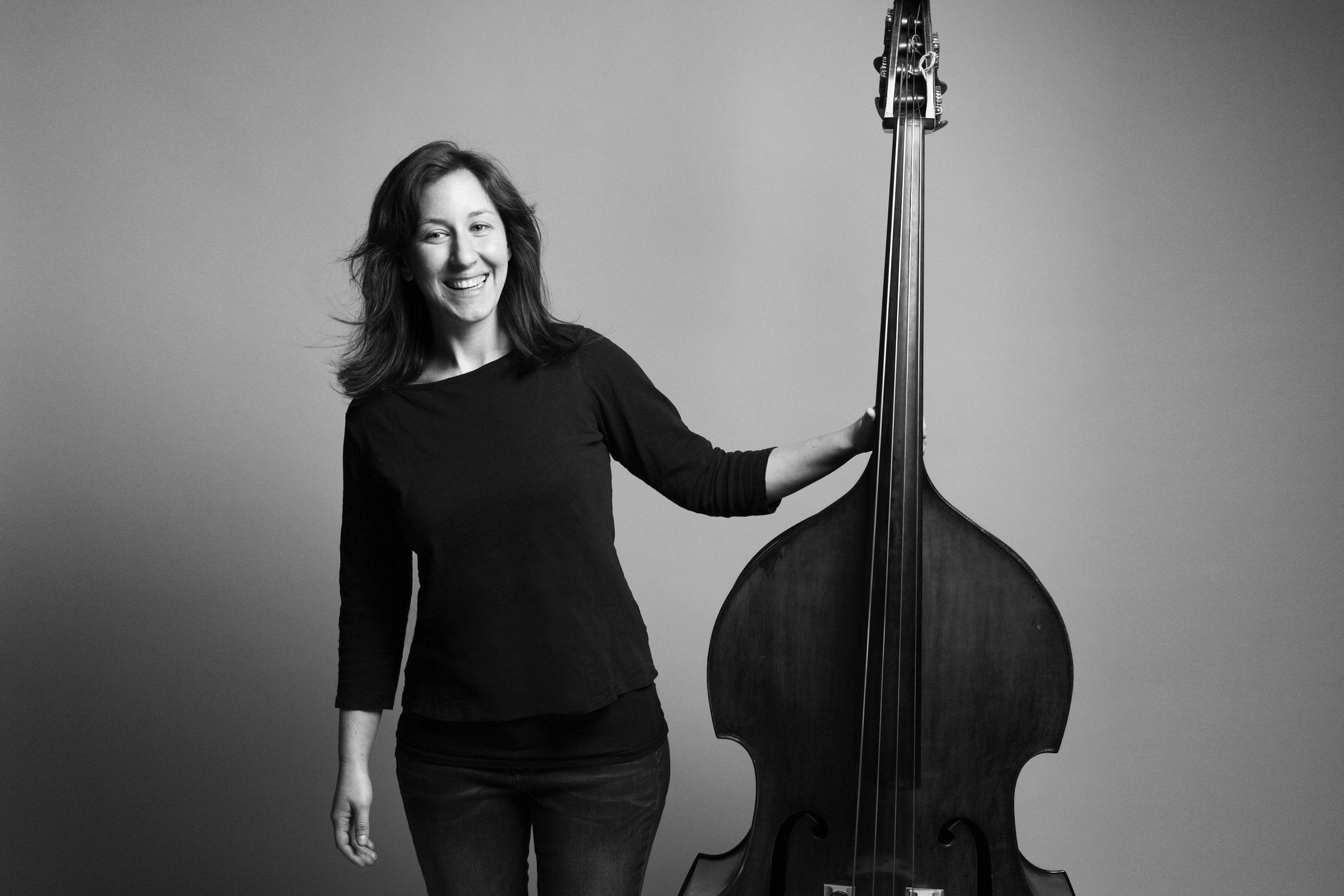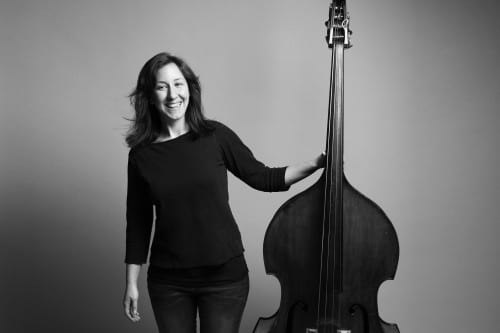Interview | Shayna Dulberger on her new album, Brooklyn jazz & exploring a personal voice

In the realm of creative music, the most important thing is originality. Musicians must have a strong sense of self, and express themselves with deliberation. In this pursuit, the possible approaches are as diverse as the people who choose to compose and perform. Among the crop of young creatives who come from the background of jazz and are defining their own way forward, Shayna Dulberger is becoming one of the most well respected.
The Brooklyn resident is a master of the upright bass. But more importantly, as the music on her forthcoming Ache and Flutter demonstrates, she’s exploring and developing her own musical voice in every aspect of the music she makes. Dulberger frequently collaborates with preeminent members of New York’s free-jazz community, and is a notable protégé of the iconic artist William Parker. From her solo project of basement loops to her Kill Me Trio, and now to her quartet, she is forging ahead with conviction.
Her quartet is made up of some fantastic musicians: Yoni Kretzmer on tenor saxophone, Chris Welcome on guitar and Carlo Costa on drums. I had a brief conversation by telephone with Dulberger ahead of the group’s upcoming performance this Thursday at Twins Jazz.
CapitalBop: What musical concepts are you exploring on your new album, Ache and Flutter?
Shayna Dulberger: I guess the obvious is counterpoint and rhythm, improvisation versus written. I also thought a lot about improvisation because I wanted composed music. I wanted it to be my record. I wanted to have a sound in my compositions. I was definitely influenced by improvisation in the sense that it is very free. But I needed a way to sort of steer the energy, so I wanted to write compositions that would trigger different styles of improvisation.
CB: Can you explain specifically some methods you utilize in exploring sound in your quartet?
SD: In one of the tunes, I definitely use a strong rhythmic sense. Then the improvisation over it is whatever the musicians improvising over that rhythm want to do. So there’s a very “inside” part happening, and a very “outside” part happening, and I wanted the contrast between the two. The melody is constantly jumping in and out of this spatial feel or a more dense feel.
Then in another tune — this one is a lot more uptempo, a little bit more swinging — I play around a lot with intervals on that one. It’s short and sporadic, then it breaks off into counterpoint. I want to create these jumping-board effects that go into a high energy improvisation. You hear that a lot in the pieces.
“The whole point of playing this music or being an artist is to really push yourself into being one with your instrument and being one with your ideas and being able to execute those ideas on the spot.”
CB: Are you composing with the specific members of your quartet in mind?
SD: Some of the tunes on Ache and Flutter are written with them in mind. Some of them are before they came into the picture — some are older. “Cookie Cutter” was written for the Kill Me Trio, which was my first band with Darius Jones and Jason Nazary. We never recorded it, though. “Myopia” was also an older one, which was on the Kill Me Trio album. On Ache and Flutter, it is just a solo version.
CB: What are your influences on this album?
SD: I guess I’m coming from a jazz background. I’m most influenced by that music. I love it, and I’ve studied it for a while. I play the upright bass because I like jazz upright bass. I love Wilbur Ware and Paul Chambers and Malachi Favors, and the list goes on and on. As far as the record goes, I was looking a lot to records that really feature the sound of the bass, like Sonny Rollins’ Live at the Village Vanguard, Paul Chambers’ Whims of Chambers.
CB: Like an homage to your influences.
SD: Yes, that’s where my roots are. I’m into the natural sound. That’s how I play. I know I’m playing more out than Paul Chambers, but that’s who I am.
CB: In the liner notes to Ache and Flutter, William Parker makes the statement that you were “chosen” to play creative music. What is your definition of creative music? What do you think he means by this? How have you manifested that being?
SD: I think that he’s saying that there are some people who aren’t good at improvising, and are not musically creative, I guess. He doesn’t really have to be saying music — it could be anybody. Its just that some people are not natural improvisers, and some people are. As far as creative music, I think it’s a really broad term, and it’s kind of hard for me to call it a genre of music, though I’m guilty of calling my music “creative music.”
I think creative music is just so personal. I think it has to do with the note choices and the sound of the player, and how connected they are with their instrument or voice or poetry or whatever. I think it has to do with the personality of the artist and how real they are. I think musicians that stop being connected, they don’t look like they’re having fun on stage, they don’t have anything to say on their horn. That’s not creative to me. The whole point of playing this music or being an artist is to really push yourself into being one with your instrument and being one with your ideas and being able to execute those ideas on the spot. I guess that’s why I’m drawn to jazz, because I think that’s the heart of jazz.
CB: Do you think creative music has to have an improvisational element?
SD: No, I don’t. I think music is creative, in general. I think when a musician is not creative, they aren’t a very good musician. It doesn’t matter how written the part is. They’re gonna have to put some kind of human quality into it.
CB: How has it been navigating the creative music community of Brooklyn, New York?
SD: In certain respects it’s hard, but I think it’s pretty hard for everyone in New York. But it’s also been very gratifying. I’ve gotten some positive feedback, and we get invited to play. It’s not that hard to get gigs. Getting good gigs is one thing, though. It’s cool. I embrace the struggle because it keeps me working hard, and that’s really important to me. [In Brooklyn] there are lots of places to play and there are so many musicians. I could go out and see four different bands tonight in four different clubs….
Even though it’s really hard making a living being a musician here, I don’t think it’s like this anywhere else. There’s so much going on. There are so many bands and so many musicians and so many spaces that open up. A lot of spaces have closed, but there is always a new space coming about. There’s always new things, always new stuff to look at, and there’s always touring bands. People from Europe come here, from California, from D.C., everywhere. It is the melting pot. So I find that really inspiring.
—
The Shayna Dulberger Quartet appears at Twins Jazz on Thursday. There is a $12 cover and a $10 minimum. Tickets can be purchased here, and more info is available here.


